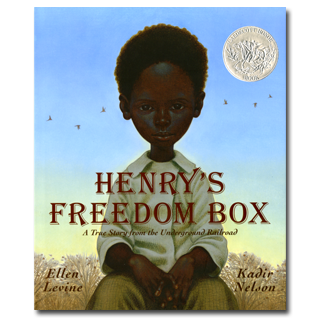
Since 1976 Black History Month has been celebrated in the United States during February. We’ll look at a couple of superb titles this month, beginning with one of the best picture information books of the decade, Henry’s Freedom Box: A True Story from the Underground Railroad by Ellen Levine, illustrated by Kadir Nelson. Ellen is an historian’s historian; she loves research—and has a nose for a superb story. While reading an 800-page book, William Still’s The Underground Railroad (1872), she came across the story of a man who mailed himself to Stills’s Anti-Slavery Society office. Slave Henry Brown built himself a box, less than three feet square, and mailed himself to freedom, a journey that took twenty-seven hours in a tight space with tiny air holes. Levine knew this true incident should be available for children, a perfect way to describe the lengths to which slaves would go to be free.
In Henry’s Freedom Box Ellen tells Henry’s story—his work and brutal treatment on the plantation, the selling of his wife and children into slavery. With the help of a white abolitionist doctor, Henry executes his plan—putting himself in a box and mailing himself to freedom. Ellen’s spare but effective text has been brilliantly illustrated by Kadir Nelson, one of the most accomplished artists working today. Brilliant in his portraits, Nelson brings us Henry as a young boy and then a young man falling in love. He shows him trapped inside the box, steeled for whatever happens in those twenty-seven hours. And in this Caldecott Honor Book, he shows us the final triumphant scene, Henry emerging from the box with a birthday (his first freedom day) and a new name, Henry “Box” Brown.
To the children’s book field, Ellen Levine has brought more credentials than most—a B.A. in Politics from Brandeis, a Master’s in Political Science from University of Chicago, and a Juris Doctor degree from New York University School of Law; she even served as a clerk for Judge Joseph Lord’s U.S. District Court. As someone who hates injustice, Levine is a passionate speaker about the rights of individuals—hence Henry “Box” Brown received his due in her hands. In another book, Freedom’s Children, she recorded the stories of thirty children and teenagers who contributed to the Civil Rights movement.
While living Ellen worked as part of the faculty for Vermont College’s M.F.A. program. As author M.T. Anderson, who taught with her there, has written: “Everything Ellen writes—fiction, non-fiction, picture books—is written out of passion. Not just passion for the truth, but passion for justice. That’s what makes her voice so unique and so defiant.” The children’s book field has, indeed, been fortunate that Ellen gave up the power of law for the power of the pen.
